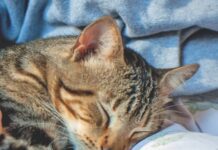A new dog training technique is called “do as I do.” The trainer does an action, basically demonstrating it to the dog. Then the dog is encouraged to copy that action. Now, it appears that some cats may be open to the same training.
According to an article in Science, a cat in Japan showed that she could do this as well. Researchers have shown the Japanese feline can imitate the actions of her owner under controlled scientific conditions. This ability has only been seen in a handful of creatures, and the finding of this cat could suggest imitation arose relatively early in mammal evolution.
“It’s really exciting,” says Kristyn Vitale, a cat cognition researcher and animal behaviorist at Unity College. “People think of cats as solitary and antisocial,” she says. “But this study reinforces the idea that they’re watching us and learning from us.”
An ethologist (behaviorist) working in Japan heard from a fellow dog trainer that her cat showed some “do as I do” training. The cat, Ebisu, lived in the trainer’s pet store. She was very food motivated which made it easy to teach her some tricks and behaviors. Unfortunately she was also a bit skittish, so the behaviorist had to come to the store to video her behaviors.
First, they showed that the cat already knew to copy a number of behaviors, including things like opening a drawer. Then, it was decided to try two new behaviors: raising your right hand (paw) to touch a box and rubbing your face on the box.
Over a series of 16 trials, Ebisu carefully copied her owner more than 81% of the time. The researchers believe the fact that the cat used her paw and her face to touch the box when her owner used her hand and her face, respectively, indicates that the cat was able to map her owner’s body parts onto her own anatomy.
Previously it was felt that only a few species, including dolphins, parrots, apes, and killer whales, truly imitate people. Adding another species, especially one known for being somewhat aloof suggests that this “copying” behavior may be widespread and have occurred early on in animal evolution. Unfortunately, Ebisu died in June from kidney failure.
doi:10.1126/science.abe9738 (Science Mag)




